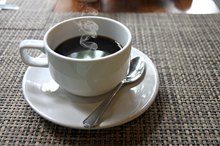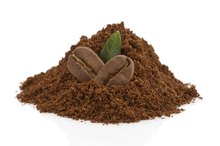What Happens When You Take Caffeine Pills & Alcohol?
The mixture of caffeine and alcohol can be toxic to your body. Caffeine appears to override the tiredness that occurs when you drink alcohol. It also delays your feeling of drunkenness. If you drink alcohol while taking caffeine pills, you are likely to keep drinking beyond your usual limits.
Considerations
The effect of using caffeine pills together with alcohol depends upon your body weight. If you are a teen or college student who has not yet built up a tolerance to alcohol, or if you are slender, you are likely to be more strongly affected by the combination.
Risky Behavior
Side Effects of Combining Ephedra & Alcohol
Learn More
The combination of caffeine pills and alcohol may impair your judgment more than drinking alcohol alone. The combination may distort how you perceive your limitations. For example, because of the caffeine's affect, you may believe you are able to carefully drive a motor vehicle, even though you have blood alcohol level above the legal limit.
Physical Effects
Most over-the-counter caffeine pills contain about 200 mg of caffeine per tablet. That's about as much as two cups of coffee. Caffeine will not help you sober up after drinking too much. Using caffeine and alcohol together may cause you to experience an upset stomach, nausea and vomiting.
- Most over-the-counter caffeine pills contain about 200 mg of caffeine per tablet.
- Using caffeine and alcohol together may cause you to experience an upset stomach, nausea and vomiting.
Prevalence
How Do Caffeine Tablets Affect Your Body?
Learn More
A study done in 2006 found that about one-quarter of college drinkers try mixing caffeine and alcohol intake in an average month, according to Wake Forest School of Medicine. The researchers found that if you mix caffeine and alcohol, you are likely to leave a bar drunker than if you stick to alcohol alone. The combination can significantly increase your risk of personal injury.
Related Articles
References
- Physorg.com: Why mixing alcohol and caffeine is so deadly
- Center For Science In The Public Interest: Caffeine Content of Food & Drugs
- The Free Dictionary: Caffeine
- Wake Forest School of Medicine: Caffeinated Cocktails:Get Wired, Get Drunk, Get Injured.
- Meredith SE, Juliano LM, Hughes JR, Griffiths RR. Caffeine Use Disorder: A Comprehensive Review and Research Agenda. J Caffeine Res. 2013;3(3):114-130. doi:10.1089/jcr.2013.0016
- Richards G, Smith AP. A Review of Energy Drinks and Mental Health, with a Focus on Stress, Anxiety, and Depression. J Caffeine Res. 2016;6(2):49-63. doi:10.1089/jcr.2015.0033
- Brunyé TT, Mahoney CR, Rapp DN, Ditman T, Taylor HA. Caffeine enhances real-world language processing: evidence from a proofreading task. J Exp Psychol Appl. 2012;18(1):95-108. doi:10.1037/a0025851
- Koppelstaetter F, Poeppel TD, Siedentopf CM, et al. Caffeine and cognition in functional magnetic resonance imaging. J Alzheimers Dis. 2010;20 Suppl 1:S71-84. doi:10.3233/JAD-2010-1417
- Harrell PT, Juliano LM. Caffeine expectancies influence the subjective and behavioral effects of caffeine. Psychopharmacology (Berl). 2009;207(2):335-42. doi:10.1007/s00213-009-1658-5
- Lucas M, O'reilly EJ, Pan A, et al. Coffee, caffeine, and risk of completed suicide: results from three prospective cohorts of American adults. World J Biol Psychiatry. 2014;15(5):377-86. doi:10.3109/15622975.2013.795243
- Abdel-Hady H, Nasef N, Shabaan AE, Nour I. Caffeine therapy in preterm infants. World J Clin Pediatr. 2015;4(4):81-93. doi:10.5409/wjcp.v4.i4.81
- American Psychiatric Association. Diagnostic and Statistical Manual of Mental Disorders. 5th edition. Washington DC; 2013.
- Turnbull D, Rodricks JV, Mariano GF, Chowdhury F. Caffeine and cardiovascular health. Regul Toxicol Pharmacol. 2017;89:165-185. doi:10.1016/j.yrtph.2017.07.025
- Centers for Disease Control and Prevention. Alcohol and Caffeine. Updated October 23, 2018.
- Alsunni AA. Energy Drink Consumption: Beneficial and Adverse Health Effects. Int J Health Sci (Qassim). 2015;9(4):468-474.
- Lyngsø J, Ramlau-Hansen CH, Bay B, Ingerslev HJ, Hulman A, Kesmodel US. Association between coffee or caffeine consumption and fecundity and fertility: a systematic review and dose-response meta-analysis. Clin Epidemiol. 2017;9:699-719. doi:10.2147/CLEP.S146496
- U.S. Food and Drug Administration. Pure and Highly Concentrated Caffeine. Updated September 21, 2018.
- National Institute on Drug Abuse. Drugs, Brains, and Behavior: The Science of Addiction. Updated July 2018.
Writer Bio
Michele Harvey began writing professionally in 2004. Her writing, pertaining to the arts, appears regularly in "I Love Chile News." Since successfully completing two years of creative writing workshops, her poetry has appeared in several literary magazines, including "The Litchfield Review" and "The Wazee Journal." She holds a Bachelor of Science degree in dietetics and nutrition from Florida International University.









